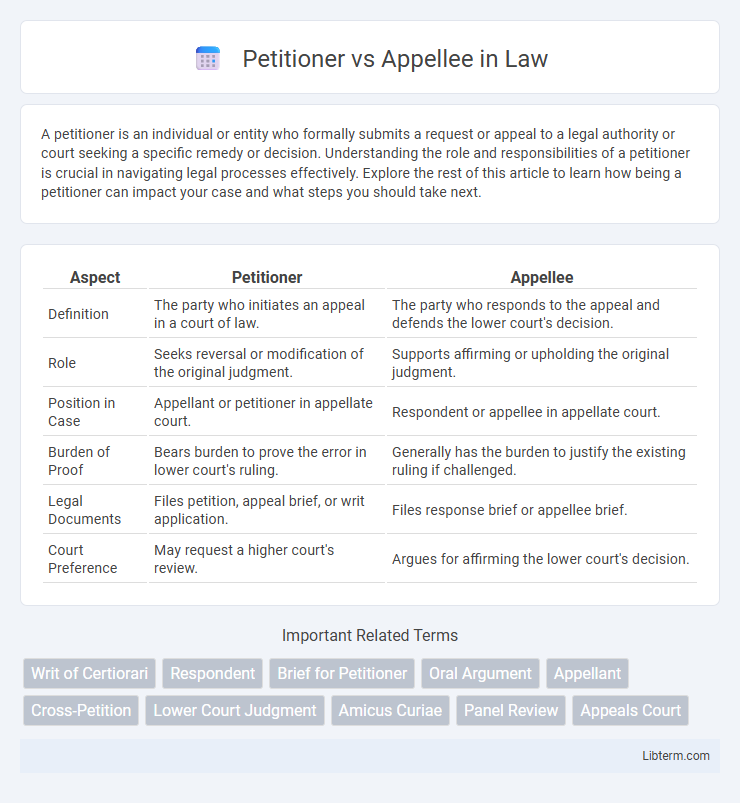A petitioner is an individual or entity who formally submits a request or appeal to a legal authority or court seeking a specific remedy or decision. Understanding the role and responsibilities of a petitioner is crucial in navigating legal processes effectively. Explore the rest of this article to learn how being a petitioner can impact your case and what steps you should take next.
Table of Comparison
| Aspect | Petitioner | Appellee |
|---|---|---|
| Definition | The party who initiates an appeal in a court of law. | The party who responds to the appeal and defends the lower court's decision. |
| Role | Seeks reversal or modification of the original judgment. | Supports affirming or upholding the original judgment. |
| Position in Case | Appellant or petitioner in appellate court. | Respondent or appellee in appellate court. |
| Burden of Proof | Bears burden to prove the error in lower court's ruling. | Generally has the burden to justify the existing ruling if challenged. |
| Legal Documents | Files petition, appeal brief, or writ application. | Files response brief or appellee brief. |
| Court Preference | May request a higher court's review. | Argues for affirming the lower court's decision. |
Understanding the Terms: Petitioner vs Appellee
The petitioner is the party who initiates a legal action or appeal, seeking a court's review of a decision. The appellee is the party who responds to the appeal, defending the lower court's ruling. Understanding these roles is crucial in appellate litigation and ensures clarity in courtroom procedures and legal documentation.
Legal Roles: Who is the Petitioner?
The petitioner is the party who initiates a lawsuit or appeals a court decision, seeking a specific legal remedy or change. In appellate cases, the petitioner asks a higher court to review and overturn the lower court's ruling. This role involves filing the petition, presenting arguments, and proving why the court should grant relief.
Legal Roles: Who is the Appellee?
The appellee is the party who responds to an appeal filed by the petitioner, seeking to uphold the lower court's decision. The appellee's legal role involves defending the original judgment or ruling against the claims made by the petitioner. In appellate courts, the appellee typically argues why the initial verdict should be affirmed, presenting evidence or legal reasoning to counter the petitioner's appeal.
Key Differences Between Petitioner and Appellee
The petitioner is the party who initiates a lawsuit or files an appeal, seeking a court's review or action, while the appellee is the party opposing the appeal, defending the lower court's decision. Key differences between petitioner and appellee include their roles in the appellate process, with the petitioner bearing the burden of proving errors in the trial court's judgment and the appellee aiming to affirm the ruling. The petitioner submits the initial appellate brief outlining grounds for reversal, whereas the appellee responds by defending the prior decision and countering the petitioner's claims.
Legal Procedures Involving Petitioners
In legal procedures, the petitioner initiates the case by filing a formal petition requesting judicial intervention or relief, setting the procedural framework. Petitioners carry the burden of proof and must present clear, compelling evidence to support their claims during hearings or trials. Responding parties, often appellees, counter the petitioner's arguments, ensuring a structured adversarial process that determines case outcomes based on presented facts and applicable law.
Legal Procedures Involving Appellees
Legal procedures involving appellees require the party to respond formally to the petitioner's claims, often by submitting briefs and evidence to the appellate court. Appellees must adhere to strict deadlines for filing responses and may present counterarguments or defenses to uphold the lower court's decision. Failure to comply with procedural rules can result in dismissal or unfavorable rulings against the appellee during the appellate process.
Rights and Responsibilities: Petitioner vs Appellee
The petitioner holds the right to initiate a legal action or appeal, seeking a court's review or remedy, and carries the responsibility to clearly present evidence and legal arguments supporting their claims. The appellee, as the responding party, has the right to defend against the petitioner's allegations and must provide counterarguments or evidence to uphold the lower court's decision. Both parties share the responsibility to adhere to procedural rules and timelines during the appellate process to ensure a fair and orderly resolution.
Common Types of Cases Involving Petitioners and Appellees
Petitioners and appellees frequently appear in appellate court cases, where petitioners seek review of a lower court's decision, commonly in family law, civil rights, and criminal appeals. Petitioners often challenge rulings related to child custody, contract disputes, or constitutional violations, while appellees defend the original judgment or order. These roles highlight the adversarial process in appeals, emphasizing the petitioner's request for reversal or modification and the appellee's position supporting the lower court's findings.
Court Decisions: How Petitioner and Appellee Status Affects Outcomes
Court decisions often hinge on the roles of Petitioner and Appellee, as the Petitioner initiates the appeal seeking reversal or modification of a lower court ruling, while the Appellee defends that decision. Judicial outcomes can be influenced by the burden of proof resting on the Petitioner to demonstrate error, with Appellees aiming to affirm the existing judgment. The dynamic between these parties shapes appellate review standards, legal arguments, and ultimately the court's ruling.
Frequently Asked Questions About Petitioners and Appellees
A petitioner is the party who initiates a legal action or appeals a court decision, seeking a specific ruling or remedy, while an appellee is the party who responds to the petition or appeal, defending the lower court's decision. Frequently asked questions about petitioners and appellees often include inquiries about their roles in appellate courts, the procedural steps each must follow, and the legal standards applied to their arguments. Understanding the distinctions between these parties is crucial for navigating appeals, as petitioners bear the burden of proving error, whereas appellees aim to support the original judgment's validity.
Petitioner Infographic

 libterm.com
libterm.com